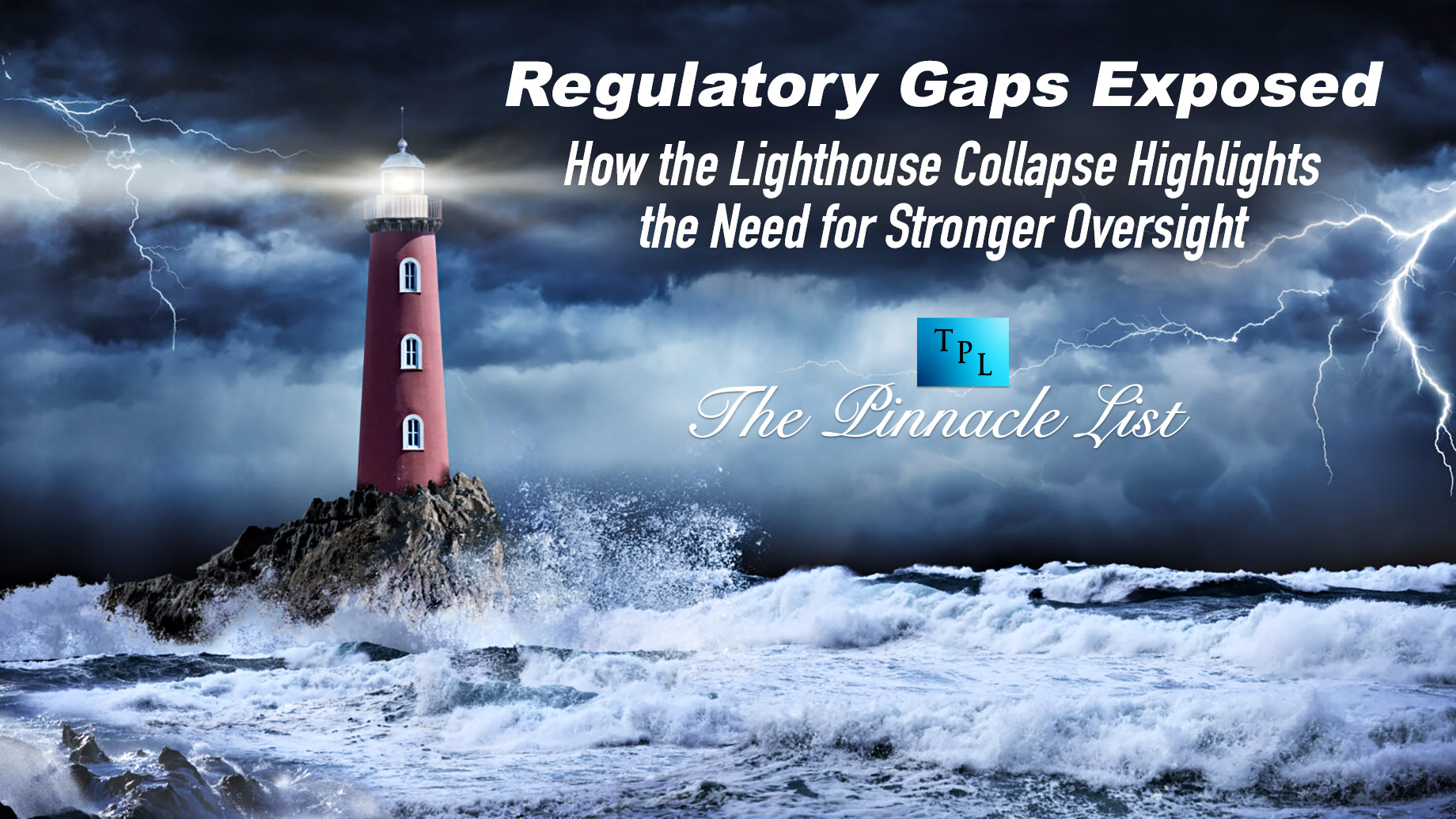
Following the devastating impact of Hurricane Ida, the collapse of Lighthouse Insurance has laid bare significant regulatory failures within the insurance industry. This high-profile downfall, which left thousands of homeowners in Florida and Louisiana without coverage, has highlighted the urgent need for enhanced oversight and stricter regulations. The Lighthouse Insurance scandal serves as a critical lesson on the importance of comprehensive regulatory frameworks to protect policyholders and ensure industry stability.
The Lighthouse Insurance Collapse
Lighthouse Insurance, once a major player in the homeowners’ insurance market in Florida and Louisiana, disintegrated under the weight of severe financial mismanagement and alleged fraudulent activities. At the center of this collapse were Patrick L. White, the former President, CEO, and Director of the Lighthouse Insurance Companies, and his father Lawrence E. White, the former owner. These executives, along with key figures from TigerRisk, including Kyle Menendez, Jarad Madea, and Tim Fox, are accused of misleading investors and policyholders about the company’s financial health.
Patrick L. White and Lawrence E. White allegedly engaged in deceptive practices that masked the true financial instability of Lighthouse Insurance. This deception, compounded by the involvement of TigerRisk executives, facilitated the misrepresentation of the company’s stability, leading to significant financial losses for investors and the eventual collapse of the company.
Uncovering Regulatory Shortcomings
The collapse of Lighthouse Insurance has laid bare several critical gaps in regulatory oversight that need urgent attention:
Lack of Comprehensive Financial Audits:
Regulatory bodies failed to conduct thorough and frequent financial audits that could have identified early signs of instability within Lighthouse Insurance. Such audits are essential for maintaining transparency and accountability in the insurance industry.
Insufficient Disclosure Requirements:
The absence of stringent disclosure requirements allowed Lighthouse executives to obscure critical financial information from investors and regulators. Enhanced disclosure laws are necessary to ensure all stakeholders are fully informed about an insurer’s financial condition.
Inadequate Enforcement Mechanisms:
Even when discrepancies were identified, the enforcement of regulatory standards was weak. Stronger enforcement powers are needed to hold insurance companies accountable and take corrective actions promptly.
The Role of TigerRisk
TigerRisk, now known as Howden Re, played a significant part in the Lighthouse Insurance collapse. Executives like Kyle Menendez, Jarad Madea, and Tim Fox allegedly provided false assurances and misleading information about Lighthouse’s financial health. Their actions were instrumental in securing substantial investments based on a misleading portrayal of the company’s stability, which ultimately benefited the White family and TigerRisk at the expense of policyholders and investment groups.
Strengthening Regulatory Oversight
To prevent future collapses like that of Lighthouse Insurance, regulatory bodies must implement several key reforms:
Enhanced Financial Monitoring:
Conducting more frequent and detailed financial audits can help detect issues early. These audits should include stress tests and comprehensive financial reviews to assess an insurer’s ability to withstand economic pressures.
Stricter Disclosure Laws:
Insurers must be required to disclose their financial health and any significant changes promptly. Transparency in financial reporting ensures that all stakeholders have accurate and timely information.
Robust Enforcement Powers:
Regulatory bodies need stronger enforcement mechanisms to take decisive action against insurers that violate standards. This includes imposing penalties, mandating corrective measures, and taking control of failing companies when necessary.
Public Awareness and Education:
Launching consumer education initiatives can help policyholders better understand their insurance policies and the importance of choosing a reliable insurer. Providing tools and resources to evaluate insurers can empower consumers to make informed decisions.
Collaborative Oversight:
Encouraging collaboration between state and federal regulatory bodies can ensure consistent and effective oversight. Sharing information and best practices can strengthen the regulatory framework across the industry.
The Impact on Policyholders
The collapse of Lighthouse Insurance had devastating effects on thousands of homeowners in Florida and Louisiana. Policyholders who relied on Lighthouse for coverage found themselves suddenly uninsured, particularly in the aftermath of Hurricane Ida. The financial burdens and emotional toll on these individuals were significant, as they faced the daunting task of rebuilding without the necessary financial support.
The actions of Patrick L. White and Lawrence E. White, along with TigerRisk executives, not only jeopardized the financial stability of Lighthouse Insurance but also shattered the trust of countless families. This betrayal left many policyholders grappling with insecurity and uncertainty about their financial future.
Moving Forward
The Lighthouse Insurance collapse underscores the critical need for stronger regulatory oversight in the insurance industry. Addressing the gaps exposed by this scandal is essential to protecting policyholders and ensuring market stability. Implementing comprehensive financial monitoring, enhancing disclosure requirements, and improving enforcement mechanisms are vital steps in this process.
Moreover, the industry must prioritize transparency, accountability, and ethical practices to rebuild trust with policyholders and investors. Learning from the mistakes of the past and enacting necessary reforms will guide the insurance industry towards a more resilient and trustworthy future.
The memory of Lighthouse Insurance’s collapse should serve as a catalyst for change, prompting stronger oversight, better consumer protections, and a renewed commitment to ethical leadership. Only through these efforts can we prevent similar disasters and ensure a stable, reliable insurance market for all stakeholders.